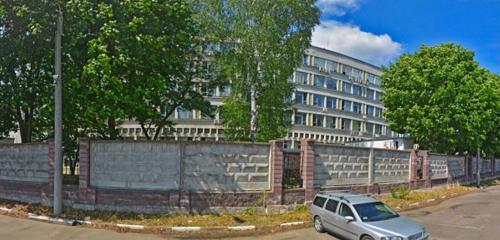Search
Directions
Obyedinenny institut Problem Informatiki Nan Belarusi Gnu
12 reviews
Add photo or video
2 more
Address
Business hours
Closed until tomorrow
Schedule
Directions
Akademija navuk
320 m
2
Show parking info

Panorama
Similar places nearby
Rate this place
12 reviews
By default
A huge willow tree grew right in front of the institute. She had a nice haircut, was big and well-groomed. And now, a couple of years ago, only a stump remained of this willow.
Why was it cut down? Did you block the light in the window? Did you interfere with solving problems?
See original · Русский
1
1
Excellent projects in the field of inf. technologies implemented by the Institute. NIIR, OCD.
See original · Русский
1
The Joint Institute of Computer Science Problems of the National Academy of Sciences of Belarus (IPI NAS of Belarus) is the main organization in the Republic of Belarus for fundamental and applied research in the field of information technology: design automation, applied mathematics, supercomputer technologies, bioinformatics and medical informatics, geoinformation systems, digital cartography, information space technologies, grid technologies.
The IPI of the National Academy of Sciences of Belarus is a state-owned legal entity under the jurisdiction of the National Academy of Sciences of Belarus, which is its founder. The institution is assigned to the Department of Physics, Mathematics and Computer Science of the National Academy of Sciences of Belarus.
The Institute is a provider of the BASNET academic network as a basic component of the scientific and information network of the Republic of Belarus, participates in the development of recommendations on the use of research results, scientific support for informatization processes in the Republic of Belarus, the development of forecasts in relevant fields of science and technology, and the training of highly qualified personnel.
The field of activity:
Conducting fundamental and applied research in the field of cybernetics, computer science, automation and applied mathematics.
Organization and conduct of comprehensive research and development work, development of recommendations on the use of research results and participation in the development of the results.
Scientific support of informatization processes in the Republic of Belarus.
Development of forecasts in the relevant fields of science and technology, training of highly qualified personnel.
The number of employees of the Institute (as of December 31, 2019) is 334 people, including 15 doctors of sciences and 57 candidates of sciences, 127 researchers.
See original
6